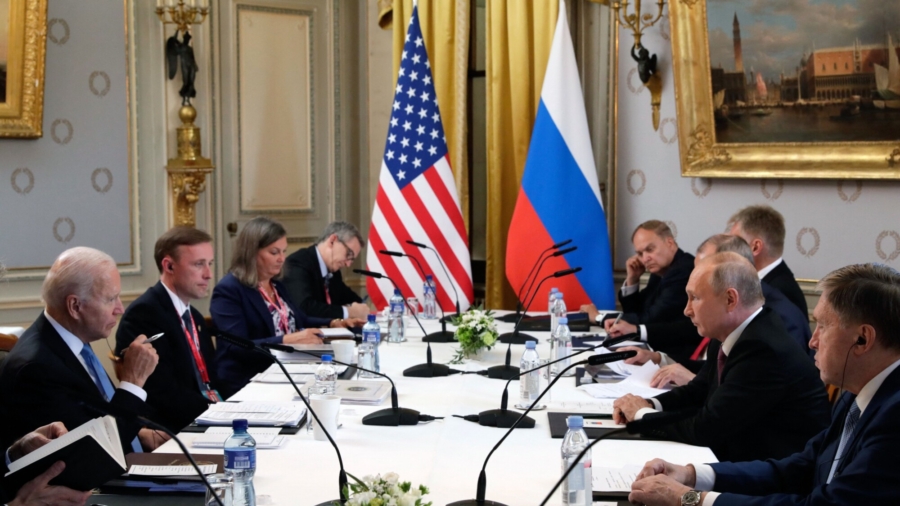Whatever signals the U.S.–Russia summit gave off, the communist party in Beijing is not taking it coolly, analysts say.
President Joe Biden and Russia’s Vladimir Putin’s first in-person meeting in Geneva took place as Washington grows more preoccupied with challenges from China, from technology to military aggression to human rights.
China dominated headlines over the past week during U.S. talks with Group of Seven (G-7), NATO leaders, and the European Union. Neutralizing Russia to focus on confronting China was a clear objective, and there were signs of progress, said Wu Chia-lung, a macroeconomist based in Taiwan.
Speaking on June 16 after a meeting with Putin, Biden told reporters that Russia is “being squeezed by China.”
“You got a multi-thousand-mile border with China,” he said of Russia in a same-day press briefing. “China is moving ahead … seeking to be the most powerful economy in the world and the largest and the most powerful military in the world.” Paralleling that, Biden said, “Russia’s economy is struggling.”

While it’s not “kumbaya moment,” Biden said he told Putin, “it’s clearly not in anybody’s interest—your country’s or mine—for us to be in a situation where we’re in a new Cold War.” “And I truly believe he thinks that—he understands that,” he added.
The meeting taking place at all, despite a rocky bilateral relationship, is a positive signal, Wu told The Epoch Times.
“Would Putin not have known what the meeting is about? Of course he would. But why did he come?” he asked rhetorically.
Weeks ago, Beijing had sent high-ranking diplomat Yang Jiechi to Moscow, but Putin only spoke with him on the phone.
Subtle details carry significance in political matters. Such seemingly differential treatment suggests that the two countries have reached some areas of agreement, he said.
A second detail worth noting, said Wu, was that Putin was punctual for once—a surprise given the Russian leader’s track record of showing up late to meetings. Putin kept German’s Angela Merkel wait for more than four hours in 2014.
“In meeting with Biden, Putin was sending a signal for the world to see—and he was willing to send off this signal,” he said.
Chinese Response
As the Geneva summit convened, the Chinese side seemed to be stepping up its effort to reaffirming friendly ties with Russia.
Just a day prior to the meeting, a Chinese representative met with Russia’s ambassador to China and “agreed to stay in close contact.”
Global Times, a Beijing-controlled nationalist newspaper, on June 18 declared Biden to be “humiliating Russia.”
“[H]opefully, Biden and his administration will not expect too much from it and the stupid idea of blasting China-Russia relations,” the editorial read. It claimed that the China-Russia partnership “has gone through tests and became an irreplaceable common strategic resource.”
And in a Wednesday press conference, Chinese foreign ministry spokesperson Zhao Lijian similarly boasted that the “sky is the limit” for China-Russia cooperation, adding, without specifying any names directly, that any attempt of “those who try every means to drive a wedge” would fail.
Narrative Warfare
The Chinese response to the Geneva meeting, in Wu’s view, seems muted, contrasting with its anger over G7’s collective rebukes.
It appears to echo recent calls of Chinese leader Xi Jinping for officials to “pay attention to the strategy and art of narrative warfare” on a global stage, Wu noted.
“Being too assertive and letting loose a torrent of abuses would only show the Western countries they were doing something right,” he said.
But to Chen Liang-chih, a researcher with the Institute for National Defense and Security Research in Taipei, such mild tones did not come as a surprise.
While the meeting was a “positive step,” it is still “too early to conclude” if, and by how much, it can help ease the existing tensions, he told The Epoch Times.
Unlike a similar summit between Putin and Biden’s predecessor Donald Trump in 2018, there was no joint press conference. Rather, the two presidents held separate briefings, with Putin going first.
“Putin is shrewd. It’s clear that U.S.-Russia relations will keep sliding downwards if he refuses a meeting,” he said. Yet, on several hot button issues, Putin was also careful leaving his views vague.
In a rare interview with NBC days earlier, he refused to weigh in on the treatment of Uyghurs and a potential military conflict over Taiwan. “The subjunctive mood is inappropriate in politics,” he said of the latter.
With Washington rallying support globally to counter China, though, Beijing’s regime is certainly feeling more pressure.
Confrontation, in the future global geopolitical landscape, is “not one between the United States and China, but between democracy and authoritarianism,” Chen said.
“The more international voices, the worse for Beijing.”
Luo Ya contributed to this report.
From The Epoch Times


